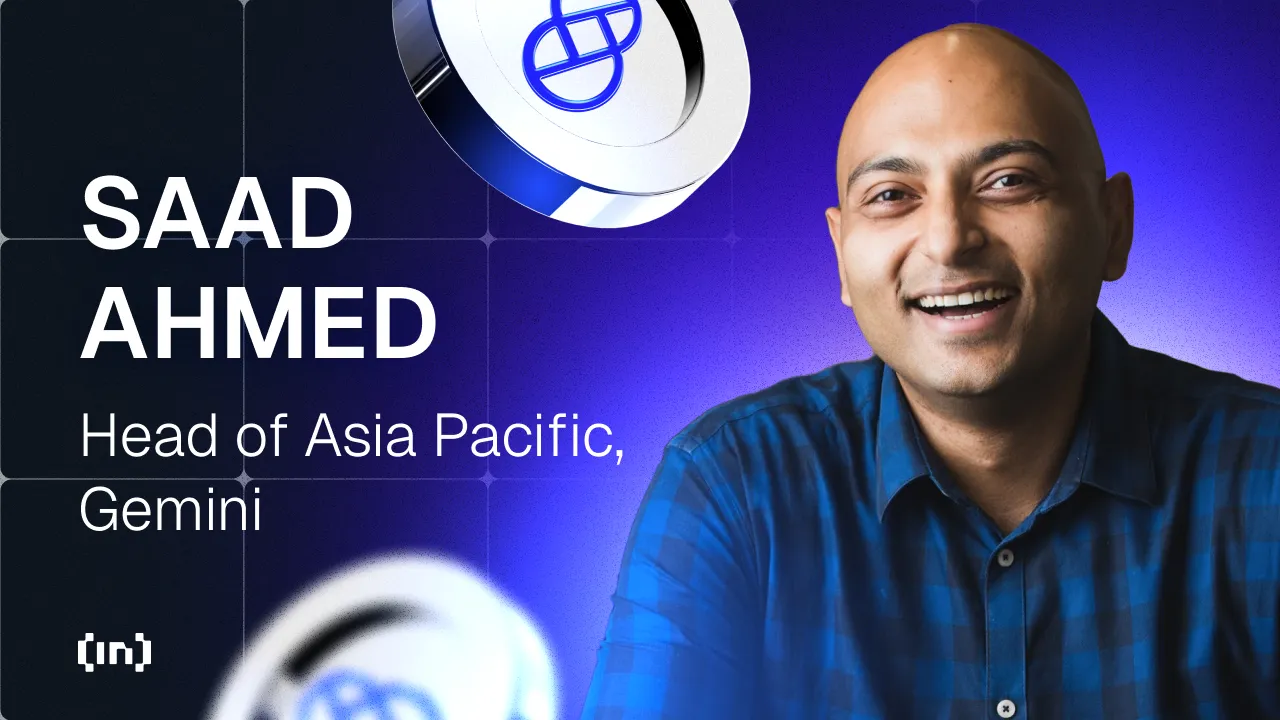Gemini's APAC Chief Saad Ahmed Talks Crypto Trends, Regulation, and Global Expansion
09/30/2024 01:00
Gemini's APAC Head Saad Ahmed discusses crypto investor resilience, regulatory challenges, and the exchange's Asian expansion strategy.
Gemini, the US-based cryptocurrency exchange founded by Cameron and Tyler Winklevoss, is expanding globally, with a focus on the Asia-Pacific (APAC) region. Leading this effort is Saad Ahmed, Head of APAC, now based in Singapore.
Ahmed, who joined Gemini in November 2023, brings experience from Uber and Grab. In this interview, he discusses crypto investor trends, regulatory challenges, and Gemini’s strategy for Asia. He also shares insights on how global events, like the US elections, may impact the crypto industry and outlines Gemini’s international expansion plans.
How do you think crypto adoption is growing?
As stated in our report published recently, crypto investors are very resilient. Despite price action in 2022 and 2023, most countries showed a marginal fall in crypto ownership, or it relatively stayed the same. Crypto owners are hodlers who continue to hodl, showing a long-term belief that this asset class has a place in a balanced portfolio.
We see stability in hodling, and people who left in 2021 or 2022 are saying they’re going to come back. 7 out of 10 in most markets said they would be allocating to crypto in the next 12 to 18 months. This paints a positive picture of resiliency and that the asset class is here to stay.
People are looking at catalysts like macro factors, US elections, and Fed rate cuts. Crypto investors are resilient and many are likely to come back in the next 12 to 18 months.
What would you say about the lack of regulatory clarity as a barrier to industry growth?
Regulatory clarity is about consistency across different jurisdictions. In the crypto industry, there are differences in how regulators are trying to regulate this asset class. Innovation usually leads to regulation. There’s a need for consistent regulation that applies across jurisdictions, making it easier for global entities to operate.
Singapore has regulatory clarity, with a focus on customer protection, encouraging dialogue between industry, customers, and regulators. They have a clear framework of rules to comply with. Despite this, some respondents still said they’d like to see more regulatory clarity, which is intriguing.
What do you expect from the US election, and how would that affect your business?
7 out of 10 people said the candidate’s stance on digital assets is an important issue in their decision-making. It’s not the only issue they care about, but it is a partisan issue being discussed in national discourse. This is the first time in a US election that this has happened.
Taken in context with everything else happening in the industry, like Bitcoin ETFs giving legitimacy to the asset class, this topic being discussed as part of campaign strategy for both parties is a good thing for the industry. It helps drive forward the dialogue around this industry and its importance. More people are realizing how it fits as part of their portfolio.
Gemini delisted the controversial Terra Luna Classic (LUNC) in September. What was the reason behind this decision?
We go through a process of auditing every asset we list and delist. We have a robust infrastructure and processes for what goes into an asset being on the platform. There’s due diligence on the founders, what the project stands for, token distribution, and what the project does.
The process involves both the compliance and legal teams. Once a project is listed, it is recorded in the system, with an infrastructure cost tied to maintaining the listing.
Various factors are evaluated to determine whether a token should remain listed or be delisted. This is done regularly, taking a holistic approach to better manage the infrastructure. New projects are added, while those no longer driving demand are removed, as many tokens experience a hype cycle of about six months before interest declines.
Do you agree that fees are comparatively higher in Gemini than in other exchanges?
There are broadly three things customers care about liquidity on the platform, product, and fees. Most people have a preference for which they value most. You could have lower fees but wider spreads, or higher fees and tighter spreads.
These are choices exchanges make when building their framework. Our understanding is that our fees are quite competitive. We need to add more liquidity.
We’re working on areas that can drive better liquidity and depth on our platform. Our fees are generally competitive, and we’re working on improving liquidity.

What kind of business scale does Gemini have in APAC?
The US is our largest market, but we’ve been present in APAC for four years. We’ve always had an office in Singapore and a team here. We built for Singapore in 2020, being one of the first exchanges with an SGD onramp. Today, we have about 40 employees in Singapore, our APAC HQ.
Over the last year, we’ve built out a strong leadership team with new heads of compliance, general counsel, strategy, institutional sales, and expansion and growth. We are eager for growth, investing in the market, and continuing to build localized experiences, onboarding flows, and payment rails.
We’re thinking of a feature set that appeals to customers in Asia and building from an Asia-focused perspective. We’re now driving expansion from Singapore to other parts of Asia.
As a global exchange, what do you care the most about?
As a global exchange, we care about building for the customers in the region. It’s how we build the best experience and give them the products and services they really want. We can’t build a global product and expect everyone to use it. We need to localize our product and offering to make it relevant.
That’s why we have a team in the APAC region. We want to drive adoption through localized products. In 2024, we’ve seen the legitimacy of this asset class with ETFs and big traditional finance names joining the industry. We’re playing a part in driving the adoption of this technology.
The legitimacy means more people will find a place for this asset class in their portfolio. We’re building products to help make that transition easier for as many people as possible.
Trusted
Disclaimer
In compliance with the Trust Project guidelines, this opinion article presents the author’s perspective and may not necessarily reflect the views of BeInCrypto. BeInCrypto remains committed to transparent reporting and upholding the highest standards of journalism. Readers are advised to verify information independently and consult with a professional before making decisions based on this content. Please note that our Terms and Conditions, Privacy Policy, and Disclaimers have been updated.